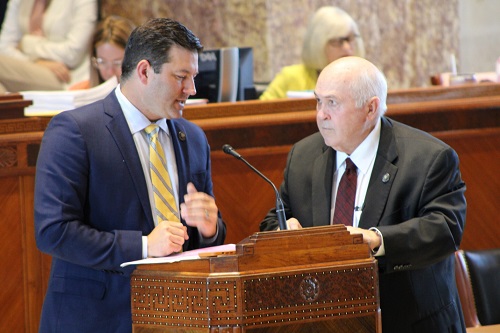
6.18.22 – Illuminator
Federal judge gave lawmakers until Monday to submit plan with 2 majority Black districts
A last-ditch bill proposing two majority Black districts for Louisiana’s six seats in Congress was pulled Saturday from the state Senate, leading lawmakers to adjourn a special session early without producing the new map a federal judge had ordered earlier this month.
The session could have lasted through Monday, the due date that U.S. District Judge Shelly Dick set for lawmakers to submit a new map with two Black districts. Five different bills filed would have created those two districts, but only one was reported from committee. The slim chance for any proposal to move forward grew even slimmer when the session’s first two days passed without any bills being advanced.
Sen. Rick Ward, R-Port Allen, brought forward a bill Friday that retained a Black majority in the 2nd Congressional District and altered the 6th District to give Black voters a slight advantage in numbers. It also dramatically reconfigured the other four districts, although they stayed majority white. The Senate and Governmental Affairs Committee sent it to the floor without a vote up or down.
When Ward’s bill came up for floor debate Saturday, senators asked for several changes to meet their local preferences. Ward then decided not to seek a vote on the amendments or the bill itself after realizing a compromise was out of reach.
“We can’t get anything collectively that will get us to 20 votes,” the amount needed for approval, Ward told the Senate before pulling his bill.
A group of Black voters sued in federal court to block the implementation of the congressional map the Legislature approved in its February redistricting session. It contains just one majority Black district of out six, although Louisiana’s Black population is close to 33% according to the 2020 Census.
Judge Dick, finding that the single-district configuration was achieved through racial gerrymandering, ruled in favor of the plaintiffs and set a June 20 deadline for a new map.
Gov. John Bel Edwards called a second redistricting session, which convened Wednesday, to meet that deadline. Lawmakers couldn’t come together any sooner because state law requires seven days notice before the start of a special session.
The Legislature’s Republican leadership insisted the judge hadn’t given them enough time to fashion a new bill, an argument Dick rejected when Senate President Page Cortez and House Speaker Clay Schexnayder presented it in her court Thursday seeking a deadline extension.
“We’ve hit the end of the road,” Cortez said Saturday after Ward’s shelved his bill.
Louisiana’s top election official, Secretary of State Kyle Ardoin is the lead defendant in the federal lawsuit, joined by fellow Republicans Cortez, Schexnayder and Attorney General Jeff Landry. They have challenged Dick’s ruling in the 5th Circuit Court of Appeal but were unable to get judges there to lengthen a temporary stay that would have prevented a second redistricting session.
In an interview after adjournment with the Illuminator, Cortez said his objective for the special session was to see if members could agree on a proposal to meet Dick’s order. He fended off suggestions that his motive was to prevent a new map from being submitted to the court.
“Clearly, there were different people from every corner of the state wanting different goals … and then there were very few shared goals,” the Senate president said.

Sen. Cleo Fields, D-Baton Rouge, offered a map with two majority Black districts that failed to advance from committee. He attempted to put the same map up as an amendment to Ward’s bill, but it was never put up for a vote after several senators objected.
Republicans in the Legislature did not make a sincere effort to add another majority Black district to the state’s congressional map, according to Fields, a former congressman and the fourth Black person to hold a U.S. House seat out of 173 people elected from the state.
“They elect more white members to Congress in one year than we have elected in a lifetime,” Fields said, “and to have such high resistance against developing a second majority-minority district is just unbelievable.”
Rep. Barry Ivey, R-Central, filed two bills with maps that added a second majority-Black district, but neither one was considered in the House redistricting committee. After the House adjourned, he called the inability of lawmakers to approve a new map a “failure of the institution.”
“I do believe we should have complied with the federal court order,” Ivey said.
Another bill with two Black districts was submitted by Rep. Royce Duplessis, D-New Orleans, who said the House speaker made no effort to comply with Judge Dick’s order to produce a new map. Although the Senate conducted business Thursday, Schexnayder did not convene the House on the day he and Cortez asked the federal court for a deadline extension.
Gov. Edwards chose to veto the congressional map approved in February only to have the GOP-dominated Legislature override it. In a statement Saturday, the governor repeated his frequent point that “simple math and simple fairness” required lawmakers to add a second Black district.
“The irony of all ironies is that for the first time yesterday, Louisiana recognized Juneteenth as an official state holiday. And today, on the actual holiday, which celebrates the day when enslaved Americans learned of their freedom, it is clear that our African-American brothers and sisters are still fighting for fair representation. Louisiana, we can and should do better than this,” Edwards said in the statement.
– Wesley Muller contributed to this report.
